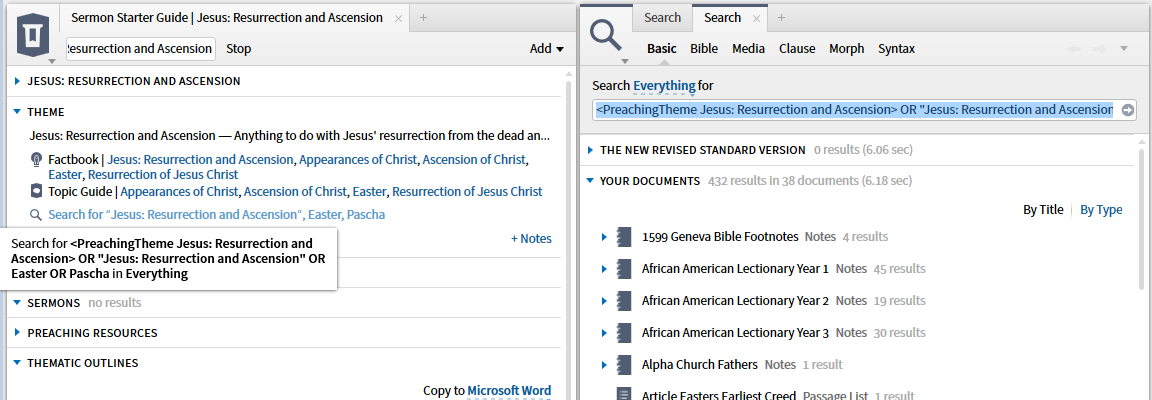Most of these searches are familiar but they include combining elements we've only seen individually and several predefined collections. Note that some searches built invalid arguments under certain conditions. Those have been reported as bugs and not included in this post.
1. We have seen the Search Extension for Section several times. Here however, the Search extension is Label and the label is journal article. From Logos 6 Help:
[quote]
Resource Labels
The following labels are typically found embedded directly into resources as part of the publication process. These labels are intended to straightforwardly present observable/intrinsic properties of the articles that they are applied to.
Generally speaking, you can use Label Entry to extend these label sets to more resources in your library for your own use.
Journal Article
Labels a single article in a journal resource. A search for this label populates the "Journals" guide section.
• Title ~ "..." — the title of the article
• Author ~ "..." — list of article writers’ names
• Topics ~ <Topic ...> — list of topic data type references associated with this article
• References ~ <...> — list of other associated data type references (mostly <Bible ...>)
• Date ~ <Date ...> — date data type reference specifying publication data of the article
• Editor ~ "..." — list of article edtiors’ names
For example:
• {Label Journal Article WHERE References ~ <Bible Romans 5> AND Topics ~ <Topic Justification>}
• {Label Journal Article WHERE Author ~ "F. F. Bruce" AND Date ~ <Date 1980>}
Logos 6 Help (Bellingham, WA: Faithlife, 2015).

2. This search is a standard datatype search on a Bible reference. Note that the library is limited to an automatic collection "All Systematic Theologies".

3. A similar search limited to All Biblical Theologies.

4. Yet another similar search limited to "All Confessional Documents" ... I keep hoping that these will be added to the collection menus as the Verbum special collections are.

5. The Same search argument against the Verbum automatic collections. Note that these collections are available for you to use in any Search from the drop down menus listing collections.

6. Here the collection is "all grammars".

7. Just as you were getting bored ...This is the familiar Search Extension Section for the datatype Grammatical Constructions. The available constructions are documented in:
- Parks, James. Greek Grammatical Constructions Documentation. Bellingham, WA: Faithlife, 2015.
- Proctor, Morris. Logos Now Training Manual. Murfreesboro, TN: MP Seminars, 2015.

8. A standard Bible datatype reference.

9. The Textual Searches section provides a series of lemma searches against predefined collections or individual resources. These searches allow you to expand your exploration of a word outside the canonical Bible.

10. Here we have a Search built based on two approaches - where the resources are tagged we search for <Topic Resurrection> which depends upon Logos tagging. For resources without topic tagging we search for Resurrection OR "Raised From the Dead". We combine the two parts of the search to allow an effective search across all resources.

11. Note the search argument in to mouse over box. Like the preceding search the argument has two parts - one for resources tagging for Preaching Themes and another for those not coded.

12. Here we have a compound search using the Journal Article Label search for any of four topics.

13. Here we see the use of the language term modified to enforce English as the language followed by a field term modifier restricting the search to headings for any of four terms - Resurrection, Ascension, Easter, Pasha ..

14. The same Search applied to the Verbum predefined collections.

15. Or an even longer similar search. Am I suspicious that this search can be simplified.
